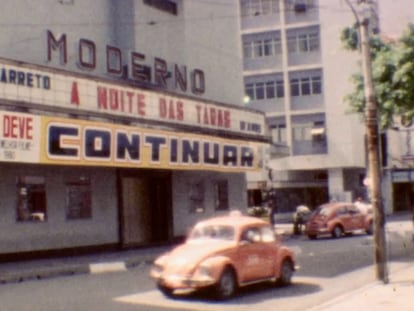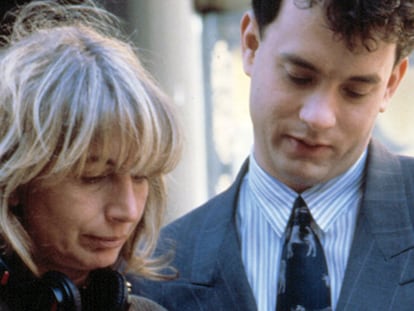Pat Andrew, the phony movie producer, a liar with many faces and victims... And the police don’t even know if he’s dead or alive
More than a dozen people tell EL PAÍS about how they lost time, enthusiasm, work and a lot of money by believing the false million-dollar promises made by an alleged producer of movies and TV series. The Spanish and Swiss authorities are investigating him, but his death cannot be confirmed

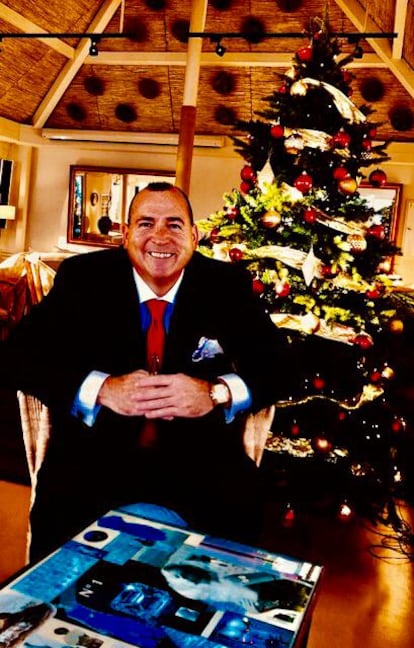
Pat Andrew introduced himself as a film producer. An important one, close to Hollywood… a friend of Steven Spielberg, with ties to Amazon and Warner Bros. His elegant suits, luxury watches and inseparable red tie reinforced his credibility, as did the hotel suites and exclusive restaurants where he used to organize his meetings. Although, in hindsight, perhaps he was better suited for the profession of actor.
The 14 sources consulted by this newspaper recognize his amazing talent for faking identities and projects. They sum him up with a variety of names: “Scoundrel, gangster, compulsive liar.” The most frequent, however, is “scammer.”
Legal cases have been opened against the American businessman in both Spain and Switzerland, for allegedly stealing labor and hundreds of thousands of euros from dozens of victims, all based on his false promises. He never actually produced a feature or series. But the film of his life has left the supporting cast feeling bitter.
While Andrew’s professional profile changes, the story of those affected is repeated almost identically. He knew how to create the feeling that something big was happening in Málaga, in the south of Spain. In each meeting, he celebrated his guest, insisting that, together, they could do great things. With his contagious enthusiasm, he always made a sensational monetary offer, dangling the prospect of working in a high-budget series or film, whether as a performer, director, musician, photographer, or nurse.
Each piece that was added to the puzzle made it more plausible. Convincing a new person to sign a contract served as collateral to access the next person. And so on and so forth. Documents with formal letterheads, some castings, promotional campaigns, meetings in luxurious places, his profile on the specialized portal IMDb, or his alleged link with heavyweights — such as producer Aaron Spelling — softened skepticism. Sometimes, people became so trusting that they worked for him for free for several months. On a few occasions, they even deposited money into his bank account.
His words, however, were never followed up by action. Even today, many are still unclear about what was real (beyond their disappointment). Not even the name “Andrew” is a certainty: he used at least three other surnames, as part of a dubious history of several decades that spans Ireland, France and the United States. In the past, he went around as Pat Austin, or Pat Augustus. At various points in time, he introduced himself as a diplomat, ex-soldier, or editor. Even his death — announced months ago via a brief email to several contacts, as revealed by the Málaga-based Diario Sur — remains shrouded in mystery.
On May 5, 2023, a court in Málaga decided to put him in the dock for repeated fraud. He was accused by the NH hotel chain of owing more than $8,000. But the producer — previously detained and released — vanished. The court was unable to verify his departure, which supposedly occurred on April 28. A search and capture order was issued on September 29, at the request of the prosecutor’s office (Sur reported this occurrence and EL PAÍS was able to confirm). But not even the Spanish justice system knows if it’s hunting a ghost.
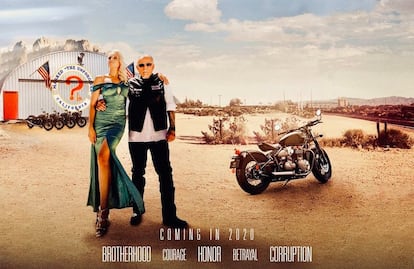
“I don’t believe [he’s dead] at all. He invents everything,” insists Swiss writer George Van Mellaert by telephone. He was, perhaps, Andrew’s main victim. His lawsuit — brought before a criminal court in Valais, in his country — also accuses Trudi Rothwell, cited by various witnesses as Andrew’s “lover, frontwoman, or business partner.” She was also known by various aliases, such as Anne Grey, Susan Handler, or Lucy Carver. The legal complaint also asks for damages: Van Mellaert ended up paying 497,600 euros ($550,000) in several installments to Andrew, supposedly to finance a TV series based on his novel Corruption of Justice.
These were “investment loans,” as the businessman also repeated in writing. But he never saw a single euro again, nor a word actually written in a script. For now, he has managed to get the Swiss government to assume the cost of procedural expenses (1,200 euros) and limited compensation (900 euros). In the coming months, the prosecutor will be forced to investigate the case, which she rejected before the writer’s successful appeal to a judge.
Numbers aren’t enough, however, to explain the suffering experienced by the Swiss author, when he discovered that he had lost everything: “To talk about a shock would be an understatement. My world collapsed. I felt nauseous. The betrayals, the manipulation, the abuse that I experienced made it a hundred times worse than if that [sum] had suddenly been robbed from me.”
Van Mellaert came to the realization that he had been conned while reading a 2016 article from The Irish Independent on his computer. Written by novelist Emily Hourican, she recalled how a peculiar entrepreneur from the United States had persuaded her to publish her first book. The text portrayed a guy who was the son of an Irish mother and an Italian father, who swore he had worked as a spy and served in the Gulf War and the former Yugoslavia, before becoming an investment banker. He seemed to be at all the important events in Dublin.”I’m sure that my description differs enormously from what’s provided by others who knew him,” Hourican warned.
“He made everything very believable,” the author shared with EL PAÍS a year ago, in a brief conversation. The fact is that the man insisted so much ― and so convincingly — that she threw herself into her novel. In the end, however, Hourican finished the book without the help of the person who had promised her so much.
Years later, when Van Mellaert read that story, it sounded terribly familiar. Just like its ill-fated epilogue, or the photo that accompanied the article. He also found two surprises: the protagonist was named Pat Austin. And it also turned out that, in 2014, the U.S. District Court for the Eastern District of New York had ordered the man in question to pay more than $6 million to three plaintiffs. He was found guilty of illicit enrichment, breach of contracts, extortion and various cases of fraud.
From there, fade to black. Just like years before, in Paris — after another default, uncovered by the newspaper Libération — until his reappearance in Málaga, with a new last name. Although he had the same habits as always.
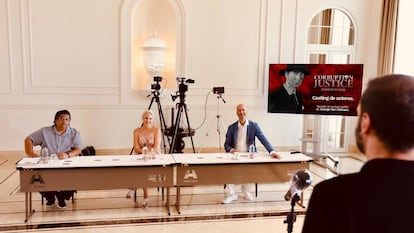
The film industry had changed by the time the phony producer reemerged. “They told us that there was a Hollywood producer who wanted to do a photoshoot and, if we helped him, he would look for an agency that would give him comprehensive support,” recalls José Carmelo Morillas, a local director in Málaga. He and his team did the work for free. And, in February 2020, they signed a contract with Andrew’s production company — Wanda-Halcyon — for one million euros per year ($1.1 million) to promote the various series that the entrepreneur would launch, with names such as The Mobking, Marked: The Unforgiven, or Corruption of Justice. “We had to scale the size of our company,” Morillas sighs. But, while they worked at a constant pace, the payments didn’t come through. The first delays coincided with the Covid-19 lockdowns, which made Andrew’s initial evasions understandable.
The world may have recovered, but Morillas didn’t recover his money. “To this day, I continue to pay for that project. I’m still in significant debt. It was thousands of euros. [We lost] all the people we worked with, until we had to close the company.”
“He told us 30 or 40 times that the money was on the way. Furthermore, he wrapped [his story in a packet] that seemed totally true,” he adds. Specifically, Andrew handed out all expenses paid trips to Paris, bottle service at the best clubs in Marbella and invitation-only nights at the five-star Miramar Hotel in Málaga. On many occasions, Morillas wondered: where did all the money come from?
Today, George Van Mellaert knows that he was the answer to Morillas’ question. The writer suspects that it’s very likely that the casting organized in Málaga for Corruption of Justice — a process involving hundreds of actors, in the summer of 2020 — was paid for with funds that came out of his own pocket. Therefore, he himself financed the false evidence that served to fuel his own deception.
“He manipulated decent people to take advantage of them for his personal benefit,” Van Mellaert reflects. The producer knew how to use the perception of having millions of dollars to sow confidence. For instance, once, when Morillas got frustrated with the delayed payments, Andrew doubled down, announcing that he had a new company — Global Television Operations — and wished to acquire the director’s agency. In return, he promised to sign Morillas as a manager and pay him a big salary.
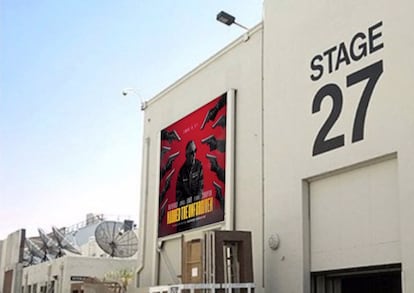
Promises, pseudonyms, new identities and shell companies were mixed up all over a board that was indecipherable for the pawns… until it was too late. The chaos even became excessive for its alleged orchestrators: one day, Rothwell sent an email to two Wanda-Halcyon employees and signed off with the name “Trudi Rothwell.” However, they knew her as Annie Grey. A quick Google search led them to the article by the Irish writer. It was one of these two workers who warned Van Mellaert.
EL PAÍS wrote seven emails to different addresses (all of them bounced back) and contacted three mobile numbers supposedly attributed to Andrew or Rothwell. The only response was a female voice on an answering machine that assured this newspaper that she would call back as soon as possible, since she was busy for several days “filming on set.”
This past July, in a document sent by the Swiss writer’s lawyer to the court in Málaga, it read: “The criminal imagination of the accused is apparently unlimited.” The novelist emphasizes that Andrew — or whatever his name was — had been perfecting this character for 25 years. And his performance was always doused with touches of reality, because many of his victims signed authentic contracts, which were reviewed by notaries or lawyers (even though they weren’t respected later). They visited offices in Málaga that the producer actually seemed to be occupying, or they saw how his announced projects were picked up by various media outlets. “It gives me some consolation that the same thing happened to so many professionals from different fields,” Morillas shrugs.
Sources from Málaga’s Hotel Soho Boutique Equitativa admitted that the producer’s move left them with “problems and unpaid sums.” And, from the sets of Pasarela (in Valencia), Figurarte (in Murcia) and Calvert Studios (in Málaga), those interviewed by EL PAÍS described identical visits made by Andrew a year ago. He had little knowledge of the industry, but plenty of ambition to try to rent their spaces for months.
“He never asked about technical aspects, which are usually the ones discussed when [touring] the facilities. He talked about how he was going to show it to the sponsors, that they were going to love it. I tried to explain other things to him, but he didn’t care,” recalls director Dan Calvert.
There were no actual productions, but there were articles mentioning various studios as the future filming locations for Andrew’s series. Each big name served as a bait for the next person to bite.
The actress Myr Garrido tells one such story like this: the current coordinator of the Spain Film Commission — Paulino Cuevas — had a conversation with casting director Eva Nilsen:
–“A friend of mine is going to the United States to make a movie.”
–“Did a certain Pat Andrew tell you that?” Nilsen asked in response.
A year ago, singer Luismi Grayonay offered EL PAÍS this anecdote: Andrew “promised us a fictional series about our band. He was talking about Amazon. We stopped all our performances because we trusted him… it did a lot of damage to our credibility.” His fellow musician, Álex Zurdo, summarizes his contact with Andrew like this: “I’ve been in the music business for 25 years. I’m a good guitarist, but it seemed like I was Jimi Hendrix [to him]. He wanted me to do the soundtrack for his productions, but I was surprised that a guy — who was theoretically so rich — would ask me for 3,000 euros.”
Morillas and health professional Juan Martín Romo both saw their names published on the payroll (even though they weren’t getting paid). They would eventually meet in a WhatsApp group for those affected by Andrew. They shared similar stories: the previous jobs they abandoned for him, the broken friendships, the difficulty of ending the toxic relationship. “Once you’ve been in it for a while, you’ve invested so much that it’s hard to back out,” is a reflection that’s repeated often. At least three sources consulted for this report claim to have filed a lawsuit against Global Television Operations for unpaid wages.
Van Mellaert also places his hopes in the justice system. Through various interrogations, he has managed to recall two details that were insignificant in the past, but are perhaps relevant today. “He never wanted to appear in videos or photos. And, once, he told me that he owned a funeral home, since it was a good business.”
New clues for the investigators continue piling up. But so much mystery has become tiresome for two other interviewees, who refuse to talk more about this story: it has already cost them too much. “Maybe when it’s a Netflix series,” one concedes. At least this way, something would finally be filmed.
With information from Nacho Sánchez.
Sign up for our weekly newsletter to get more English-language news coverage from EL PAÍS USA Edition
